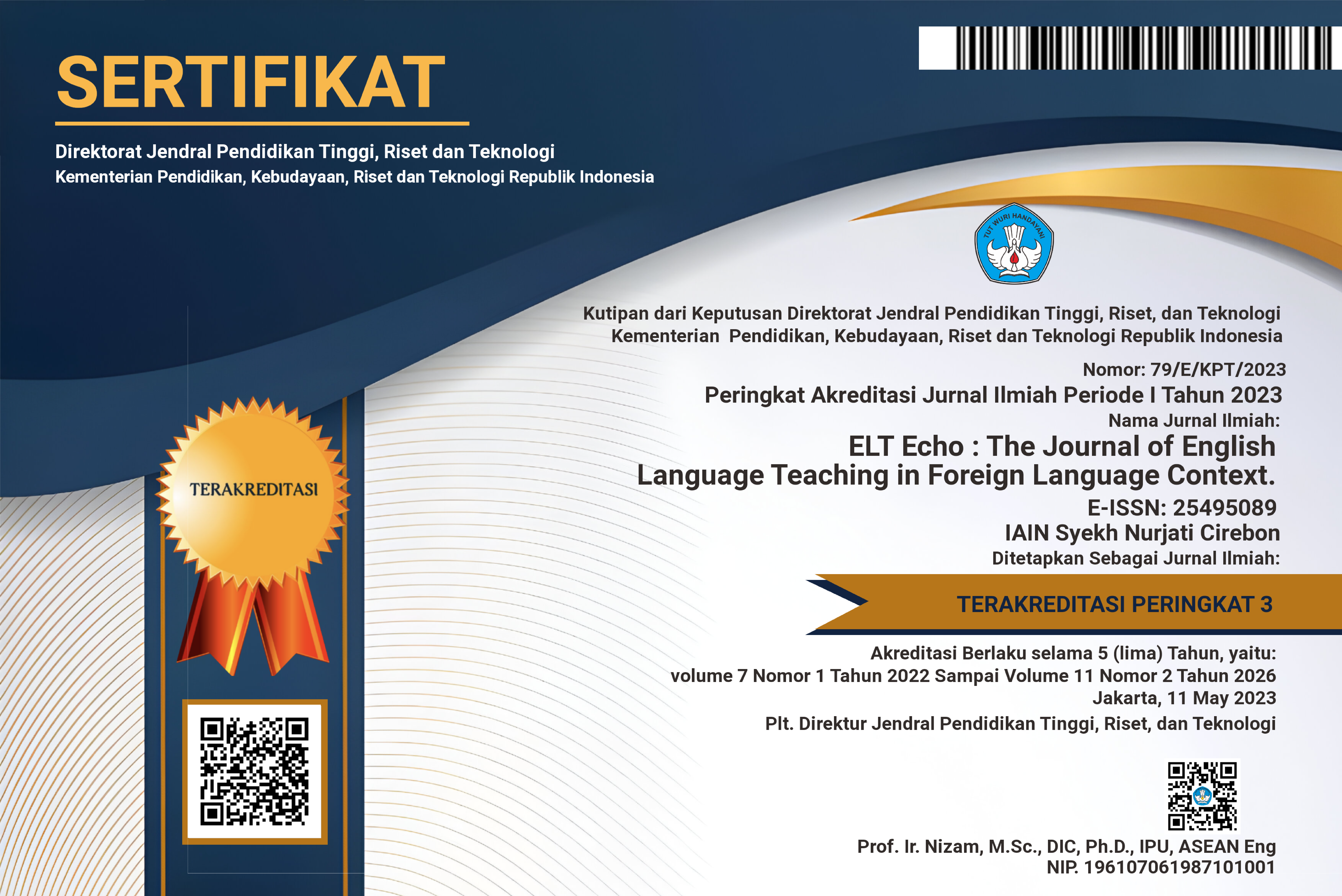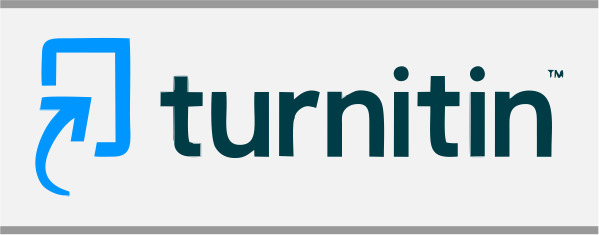IMPLEMENTING GOOGLE CLASSROOM-BASED COGNITIVE STRATEGY OF ENGLISH FOR SPECIFIC PURPOSES
(1) Akademi Sekretari Budi Luhur
(*) Corresponding Author
Abstract
Keywords
Full Text:
PDFReferences
Abazi-Bexheti, L., Kadriu, A., Jajaga, E., Apostolova-Trpkovska, M., & Abazi-Alili, H. (2018). LMS solution: Evidence of Google Classroom usage in higher education. Business Systems Research: International journal of the Society for Advancing Innovation and Research in Economy, 9(1), 31-43.
Adnan, M., & Anwar, K. (2020). Online Learning amid the COVID-19 Pandemic: Students' Perspectives. Online Submission, 2(1), 45-51.
Ahmadi, D., & Reza, M. (2018). The use of technology in English language learning: A literature review. International Journal of Research in English Education, 3(2), 115-125.
Ashman, A. F., & Conway, R. N. (2017). Cognitive strategies for special education: Process-based instruction. Routledge.
Atmojo, A. E. P., & Nugroho, A. (2020). EFL classes must go online! Teaching activities and challenges during COVID-19 pandemic in Indonesia. Register Journal, 13(1), 49-76.
Azhar, K. A., & Iqbal, N. (2018). Effectiveness of Google classroom: Teachers' perceptions. Prizren Social Science Journal, 2(2), 52-66.
Bayarmaa, N., & Lee, K. (2018). A Study on the Application of Google Classroom for Problem-Based Learning. Journal of the Korea Academia-Industrial Cooperation Society, 19(7), 81-87.
Bayarmaa, N., & Lee, K. (2018). A Study on the Application of Google Classroom for Problem-Based Learning. Journal of the Korea Academia-Industrial Cooperation Society, 19(7), 81-87.
Chapelle, C. A., & Voss, E. (2016). 20 years of technology and language assessment in language learning & technology. Language Learning & Technology, 20(2), 116-128.
Chen, T., Peng, L., Jing, B., Wu, C., Yang, J., & Cong, G. (2020). The impact of the COVID-19 pandemic on user experience with online education platforms in China. Sustainability, 12(18), 7329.
Chinmi, M., Marta, R. F., Haryono, C. G., Fernando, J., & Goswami, J. K. (2020). EXPLORING ONLINE NEWS AS COMPARATIVE STUDY BETWEEN VENDATU AT INDIAAND RUANGGURU FROM INDONESIA IN COVID-19 PANDEMIC. Call for Papers, 167.
Di Carlo, S. (2017). Understanding cognitive language learning strategies. International Journal of Applied Linguistics and English Literature, 6(2), 114-126.Di Carlo, S. (2017). Understanding cognitive language learning strategies. International Journal of Applied Linguistics and English Literature, 6(2), 114-126.
Gabriele, L., Marocco, D., Bertacchini, F., Pantano, P., & Bilotta, E. (2017). An Educational Robotics Lab to Investigate Cognitive Strategies and to Foster Learning in an Arts and Humanities Course Degree. International Journal of Online Engineering, 13(4).
Gilakjani, A. P. (2017). A review of the literature on the integration of technology into the learning and teaching of English language skills. International Journal of English Linguistics, 7(5), 95-106.
Gilakjani, A. P., & Sabouri, N. B. (2016). Learners' Listening Comprehension Difficulties in English Language Learning: A Literature Review. English language teaching, 9(6), 123-133.
Havens, P. S., & Williams, M. S. (2019). University Peer-Assisted Learning Strategies in the Humanities. Journal of College Reading and Learning, 49(3), 160-169.
Izenstark, A., & Leahy, K. L. (2015). Google classroom for librarians: features and opportunities. Library Hi Tech News.
Kashefian-Naeeini, S., & Maarof, N. (2016). A study of the use of language learning strategies among students in Iran. Malaysian Journal of ELT research, 6(1), 39.
Koc, D. K., & Koc, S. E. (2016). Understanding learner autonomy through cognitive, metacognitive and social strategies used by English language learners in a computer-based classroom. Journal of Language Teaching and Learning, 6(2), 58-69.
Kumar, J. A., Bervell, B., & Osman, S. (2020). Google classroom: insights from Malaysian higher education students' and instructors' experiences. Education and information technologies, 25(5), 4175-4195.
Lai, C. (2015). Modeling teachers' influence on learners' self-directed use of technology for language learning outside the classroom. Computers & Education, 82, 74-83.
Liu, H. C., & Chuang, H. H. (2016). Integrating Google Classroom to Teach Writing in Taiwan. Minnesota Summit on Learning & Technology.
Qazi, A., Naseer, K., Qazi, J., AlSalman, H., Naseem, U., Yang, S., ... & Gumaei, A. (2020). Conventional to online education during COVID-19 pandemic: Do develop and underdeveloped nations cope alike. Children and Youth Services Review, 119, 105582.
Regan, K., Evmenova, A. S., Sacco, D., Schwartzer, J., Chirinos, D. S., & Hughes, M. D. (2019). Teacher perceptions of integrating technology in writing. Technology, Pedagogy and Education, 28(1), 1-19.
Santos, O. C., Saneiro, M., Boticario, J. G., & Rodriguez-Sanchez, M. C. (2016). Toward interactive context-aware affective educational recommendations in computer-assisted language learning. New Review of Hypermedia and Multimedia, 22(1-2), 27-57.
Shao, K., Pekrun, R., & Nicholson, L. J. (2019). Emotions in classroom language learning: What can we learn from achievement emotion research?. System, 86, 102121.
Sholah, H. M. (2020). Teaching and Learning English Using Google Classroom for Indonesian Students. Jurnal Pusaka, 8(1), 1-12.
Syakur, A. (2020). The Effectiveness of English Learning Media through Google Classroom in Higher Education. Britain International of Linguistics Arts and Education (BIoLAE) Journal, 2(1), 475-483.
Troussas, C., Chrysafiadi, K., & Virvou, M. (2019). An intelligent adaptive fuzzy-based inference system for computer-assisted language learning. Expert Systems with Applications, 127, 85-96.
Vongkrachang, S., & Chinwonno, A. (2015). CORI: Explicit Reading Instruction to Enhance Informational Text Comprehension and Reading Engagement for Thai EFL Students. PASAA: Journal of Language Teaching and Learning in Thailand, 49, 67-104.
Wahyono, E. (2019). Correlation between students' cognitive reading strategies and reading comprehension. Jurnal Studi Guru dan Pembelajaran, 2(3), 256-263.
DOI: 10.24235/eltecho.v6i1.8075
Article Metrics
Abstract view : 72 timesPDF - 15 times
Refbacks
- There are currently no refbacks.
Â
This Journal is indexed by:
Â

This work is licensed under a Creative Commons Attribution 4.0 International License.










